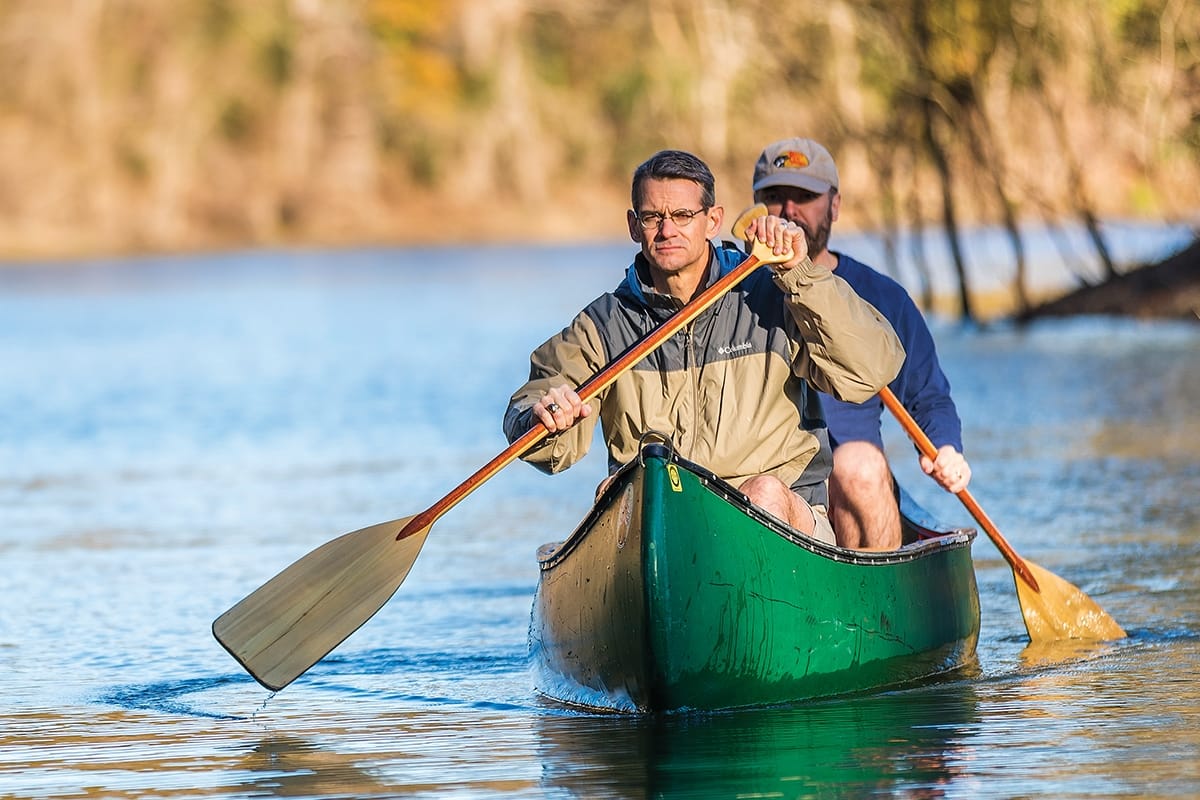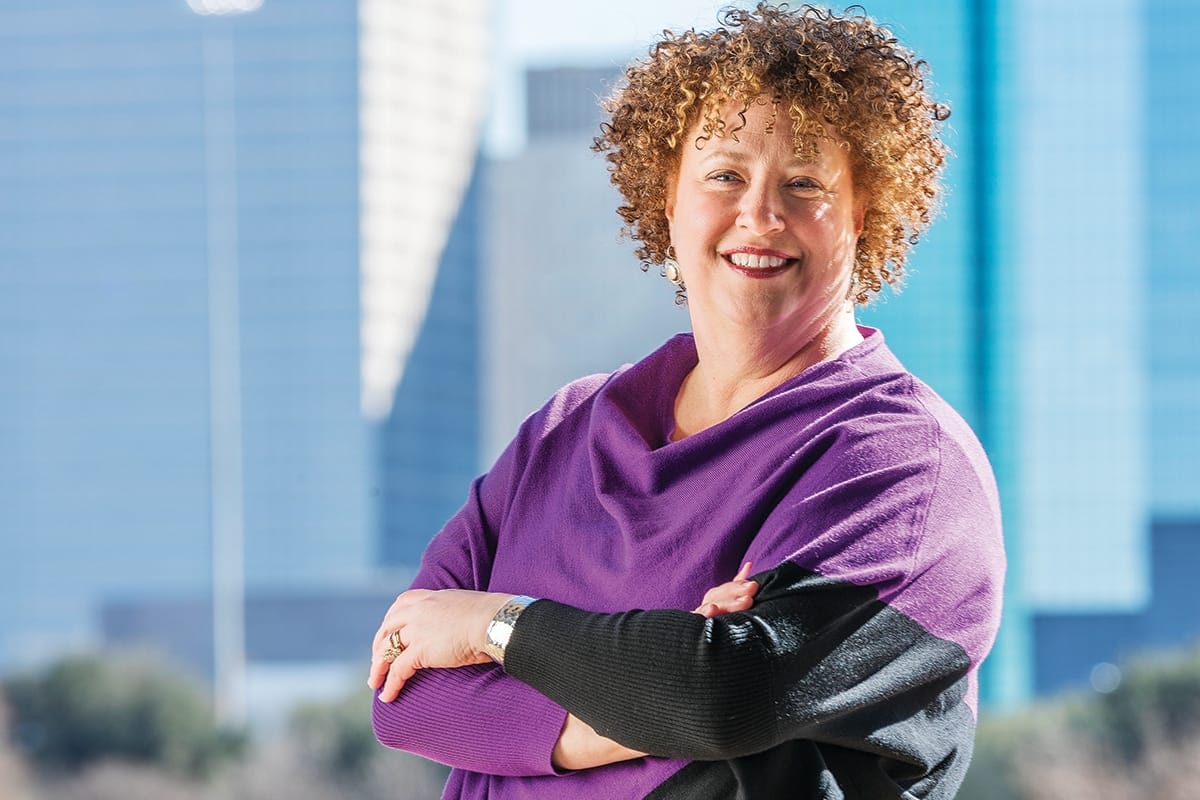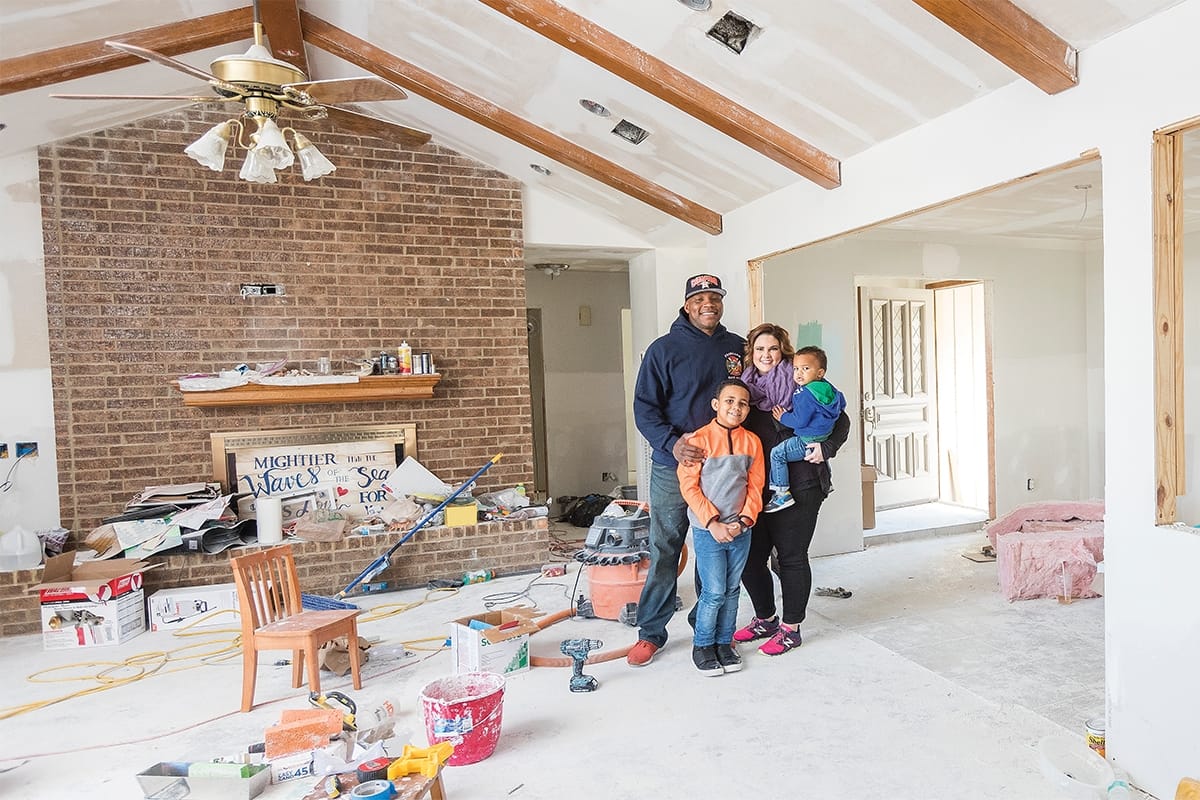Enlarge

Photo by Jeremy Enlow
His canoe was the only way he and his neighbor, Michael Pratt, could navigate the paved streets in a North Houston neighborhood. So they paddled past half-underwater houses and SUVs, and looked for signs of life.
The 16-foot-long Evergreen Prospector canoe had been a Christmas gift. Now, it was a lifeboat.
One by one, residents trapped in their homes opened windows to call back: “Yes! We want out! We want to leave!”
Sunday, Aug. 27, 2017, was the first of three days McLeod (’94) spent paddling and wading through dirty brown water caused by Hurricane Harvey and the “1,000-year flood” it spawned, an epic late-summer storm that crushed the Gulf Coast, leaving the greater Houston area in its wake.
Enlarge

Photo by Jeremy Enlow
“Deep within, it was like, ‘I can’t not do something,’ ” McLeod said months later. “Maybe I can help get somebody out of a bad situation. I’m a believer in Jesus, and there’s nothing that makes me more like him than when I get out of myself and work to be his hands and feet. I don’t say that to sound cheesy; it’s the truth.”
“I’m not a superhero,” he said. “I’m serious – what we did was not remarkable at all. We were just doing what needed to be done.”
Like many communities, Abilene Christian’s rallied to care for others in Harvey’s wake. Some helped rescue people. Others prayed, or donated money, or helped connect those in need with churches who were providing aid. Others were displaced by the storm and were on the receiving end of such help. Some lost most of their belongings.
Still, the shock, worry, fear and even anger didn’t stop people from acting, from jumping into literal or metaphorical lifeboats and braving the water.
“There was beauty in the disaster,” said Carri (Teague ’88) Hill, university relations manager for Houston. “There was beauty in the giving, and the opportunity to rebuild. In the midst of disaster, the people of God rose up and loved the stranger.”
We’ve seen a thing or two
Preparing for a natural disaster could be compared to sprinting through the five stages of grief: You’d better get to acceptance quickly if you want to survive.
McLeod, who owns a Farmer’s Insurance agency in Spring, realized there was only so much preparation that could be done before a storm the size of Harvey. He knew the business and his family’s home in Tomball would be OK, but he fielded calls for days from worried clients further south, especially in Corpus Christi and Rockport. Harvey was headed directly for them.
A majority of Houstonians decided to wait out the storm. As footage of heavy rains and rising waters blanketed the news, folks around the U.S. and the world unfamiliar with Texas geography learned why: Greater Houston – which includes Houston, The Woodlands and Sugar Land – is about 10,000 square miles and the fifth-largest metropolitan area in the nation with a population of about 6.7 million. Evacuation wasn’t necessarily an option.
Rescue wasn’t easy, either. FEMA, the Federal Emergency Management Agency, couldn’t possibly reach everyone, which is likely why thousands of Texans and Louisianans like McLeod made lifeboats out of canoes, pontoons and other vessels.
“Houston is very resilient,” Hill said. “We’ve been through storms and hurricanes before. I’ve seen semi-trailer trucks floating down Interstate 10. But this was on a whole ’nother level of devastation. It took a little while for that to sink in, to how widespread the destruction was. It wasn’t just one section of town.
A city about the size of Massachusetts was under water.”
At least 30 inches of rain fell during the storm, with some areas seeing up to 60 inches. The total volume of water dispersed across Texas, Louisiana, Tennessee and Kentucky amounted to about 33 trillion gallons. Harvey is the wettest tropical cyclone on record for both Texas and the U.S., displacing more than 30,000 people and leading to more than 17,000 rescues.
Hill had been in Abilene to move ACU freshman Bryce, her middle child, into his residence hall. She stayed with her parents in Irving, Texas, during the worst of the storm, getting updates from her husband, Chris, back home. It took almost a week for her to make it there; her house had water damage but wasn’t flooded.
Enlarge

Photo by Jeremy Enlow
Azzie is a former ACU linebacker who grew up in Seabrook, along the Gulf Coast. Hurricanes and the need to evacuate aren’t new to him, but he’d never seen a storm like this. He drove home to find a neighborhood already being turned upside down, with piles of rubbage at neighbors’ curbs and an unpleasant smell coming from his house. It was filled with sewage from Dickinson Bayou.
“I walked in the house and stood there for a second, and then I started going around and seeing what was gone,” he said. “I touched the mattresses – already moldy. You could see the water line on the sofas. None of it could be saved.”
“He was exhausted,” Ashlee said, “and coming into that … where do you even begin?”
He went to work cleaning and repairing the house. She tackled the FEMA paperwork and kept friends up to date on Facebook, posting photos sent by Azzie of their belongings, now trash, hauled outside. Friends created a GoFundMe.com fundraiser for the family. And a couple of strangers in South Carolina began planning how they could help the Beagnyams.
Jennifer (Townsend ’98) Frye, of Keller, Texas, got the ball rolling. Watching the news, she saw the need to help others but preferred to find a direct way to contribute instead of donating to a large organization.
She and Ashlee are Facebook friends, their families having attended church together when the Beagnyams lived in the Metroplex. Seeing Ashlee’s photos, Frye published a post of her own, telling friends that if they, like her, prefer to give to a specific family, she knew of one in need.
Herb and Shannon Dew of Greenville, South Carolina, answered the call. They didn’t know the Beagnyams, but they knew Jennifer and her husband, Sean. The Dews spread the word among their friends, and collected and purchased enough items – clothes, furniture, housewares, artwork, you name it – to furnish a three-bedroom apartment for the Beagnyams. And they were adamant about the Beagnyams having an apartment that size while they rebuilt their home – so much so that they paid the rent for several months. The Dews rented a U-Haul vehicle, loaded it and drove the more than 900 miles to Texas.
The Frye family was on hand – with more items and monetary donations to deliver – when the Dews arrived in Houston with a truck full of the Beagnyams’ new belongings. Jennifer took photos of Ashlee as she reacted to their arrival and as her apartment came to life and became a home. She’s smiling ear to ear in all of them.
“It was amazing,” Frye said, choking up a bit. “I felt really honored to have had a hand in it. They’re just such a sweet family.”
“None of this would have happened if I hadn’t followed my gut to make that first Facebook post,” she said. “I’m not controversial and didn’t want to stir the pot and make people think it’s bad to give to an organization. When the Holy Spirit is leading you, you need to listen and be obedient. Even if it feels scary, just do it. It’s amazing to see how God worked in this whole situation.”
“You never think something like this will happen to you,” Ashlee said. “I don’t know why God provided Herb and Shannon to us. But I’m so thankful and blessed.”
“It’s not that we didn’t know who God was,” she said. “But they solidified that God is good, and he is here for us.”
Wildcats Helping Wildcats
Thanks to Facebook, Ashlee and Azzie’s lives changed, and they weren’t alone. Love it or hate it, the behemoth of a social network was a critical tool for those affected by Harvey to seek help and for others to offer it.
ACU pointed alumni and friends to its recently created Facebook group, Wildcats Helping Wildcats, as a platform for connecting with each other and with resources. Post after post came in: This church needs help; that church has a disaster relief team ready to work; this alumna designed a T-shirt and proceeds from its sales will go to victims; that alumnus is collecting items to take from Abilene to Houston; and so on.
Hill worked to connect alumni and friends in need with churches and other groups providing aid. She and Craig Fisher (’92), assistant vice president for alumni and university relations, also found a way for more alumni to engage in relief efforts: gift cards.
The Sept. 15-16, 2017, Grand Opening weekend of Wildcat Stadium came three weeks after the storm cleared. Those attending the Friday NEEDTOBREATHE concert and Saturday’s tailgating and game were encouraged to bring gift cards to major retailers that would be distributed to alumni in need in the Houston area. All together, cards collected totaled more than $2,000.
Hill gave cards to Impact Church, Grace Crossing and Cinco Ranch Church of Christ to share. The rest she distributed herself over several months, criss-crossing the Greater Houston area and meeting with families for hours, listening to their stories. Some had lost so much, she said, that the thought of a $100 gift card seemed to them more like winning the lottery.
“It’s a holy space, when people are so resilient and so strong and doing everything they can to rise from the ashes,” she said. “I was able to come
in with this relatively small gift and they were each one so gracious and
so thankful.”
“Being in a place of needing to receive help can be very uncomfortable,” she said. “If you give me something, I want to be able to repay you. That’s a natural thing, especially with Americans. This isn’t that. This is just, ‘You need to take it.’ That’s a hard dose of medicine to swallow. But there’s real beauty in it, and something truly tender that happens. Being able to be in that
space representing my fellow alumni was precious.”
Later, one of the people with whom she met sent Carri a text, letting her know they’d just bought groceries for their family. “This week’s food is on the ACU community,” they said. “I can’t think of a better word for that than ‘holy,’ ” Hill said.
She brought with her more than gift cards from her alma mater; she had a stack of note cards containing messages, prayers and Scriptures written by Abilene Christian students to Harvey victims.
Dr. David Kneip (’03), assistant professor of Bible, missions and ministry, helps coordinate his department’s Chapels, which in 2017-18 followed the theme “With Jesus at the Margins” and examined ways Christians are able to join Jesus in ministry to people in various kinds of need, he said. He and his team of students came up with the plan for students to write these cards during
a Chapel service.
“We knew we couldn’t directly hand out bottled water or help clean a house in that moment, but we could still extend the love of Jesus from afar,” he said. “As a worship leader and a professor teaching worship classes, I want our students to know that worship isn’t just something that lives in our heads or hearts but ideally flows into our lives,” he said. “My experience is that many people like being given something to do in worship, and this was something tangible and direct.”
The cards were a “donation of love,” Hill said – like bringing a piece of ACU to Houston. When Hill met with Ashlee in November, Ashlee asked to keep one of the cards from a Dickinson student who said he was praying for his hometown. It served as a reminder that people cared for her, she said. The gift card she was given helped the family purchase a Christmas tree and gifts for
her children.
“When you give monetarily, or you give of your time and your skill set, it matters and it makes a difference,” Hill said. “It’s not an exercise in futility. That could not have been made more true to me than in this situation. Every one of those gift cards made a difference – every dollar spent and prayer sent made
a difference.”
“Our students wrote such sensitive and thoughtful notes,” Kneip said. “We have students with some really great hearts around here at ACU, and when they have a willingness to serve, wonderful things can happen.”
‘There is restoration’
Driving through Houston in mid-January 2018, Hill noted residents still living in tents in their front yards or recreational vehicles in their driveway. Many are still in rented apartments or staying with loved ones.
Hill considers them the real heroes: the ones who work all day and then spend their evenings and weekends rebuilding their homes. If there’s one thing she wants to impress upon others, it’s that the work continues.
Her work isn’t over, either, as she gets back into a more typical schedule of visiting schools and organizing alumni events. Her Harvey-related efforts weren’t out of line with her job, however, she said.
“Our mission is to educate students for Christian service and leadership, but we also take that to the next level,” she said. “Yes, we’re equipping students, but then we take that forward. That is the very heart of my job: When I show Christian service and leadership, those ripples go out, and they come back.”
“There’s a lot of sadness in this story, but there are beams of light as well,” Hill said. “There is hardship, but there is light and there is giving and there is restoration.”
